Introduction: In this article, Mary Harrell-Sesniak searches old newspapers to find recruitment ads that induced men, both in the North and the South, to enlist in the Civil War. Mary is a genealogist, author and editor with a strong technology background.
If your ancestor served in the Civil War, do you know what induced him to sign up?
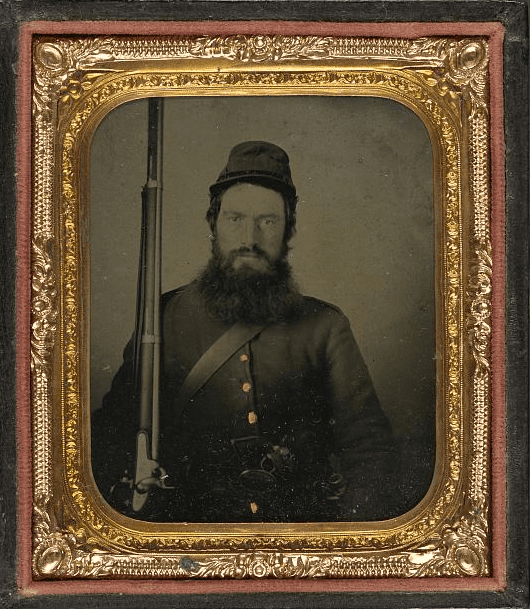
Many people think that Civil War recruits were drafted, or they volunteered for love of country. Yes, many did – but the perks that were extended for signing up swayed their choices. Since many of these inducements were advertised in newspapers, take an excursion through the classified sections of old papers to understand why your ancestor may have signed up, or chose a particular branch of the service.
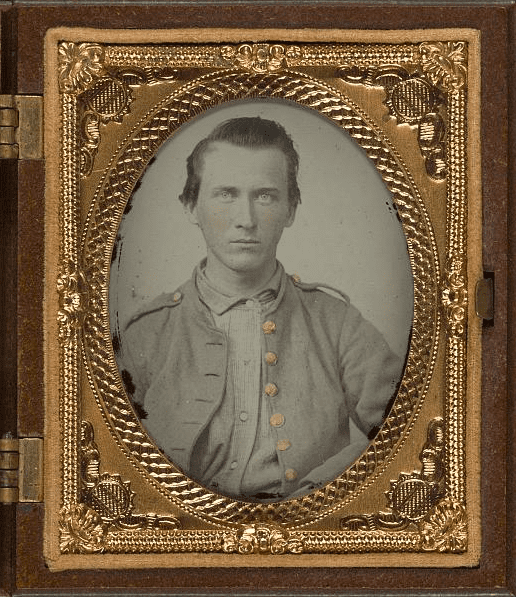
What you find may surprise you. The newspaper recruitment advertisements are fascinating!
Appealing Slogans
Both the Union and Confederates armies needed recruits, and they needed them in a hurry. Not surprisingly, as seen in these advertisements from an 1862 Louisiana newspaper, different groups and branches of the service had competing ads with fun slogans. (New Orleans, the largest Confederate city, fell to Union forces on 1 May 1862, which is why these newspaper recruitment advertisements published in a New Orleans newspaper on 18 October 1862 are calling for recruits to the Union forces.) Some of the recruitment ads were for guards, volunteers and other troops:
- Young man, your country wants you! (Louisiana Volunteers)
- Fall in! Fall in! (Nelson Guards)
- Union! Fraternity! Equality! Rally! Rally! Rally to the Call! (John Brown Guards)
- Rare chance to enlist. Four buglers and a few able bodied men needed. (Regular U.S. Artillery)
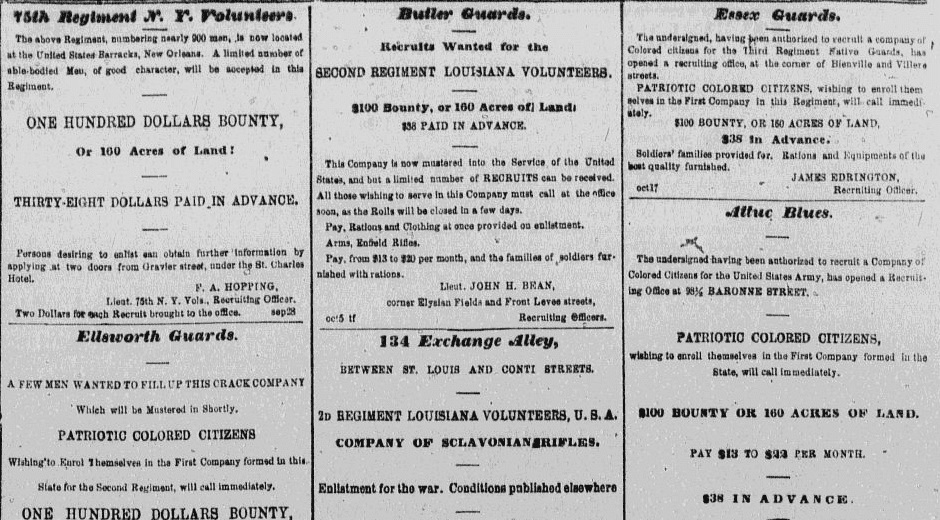
Bounty Land
One of the recruitment ads in the New Orleans newspaper shown above is for “patriotic colored citizens, wishing to enroll themselves in the First Company formed in the State.” A bounty, which is an inducement of something of value, was offered. Recruits could receive $100 or 160 acres of land with arms, rations and equipment, along with rations for their families. The pay was $13 to $22 per month with $38 in advance.
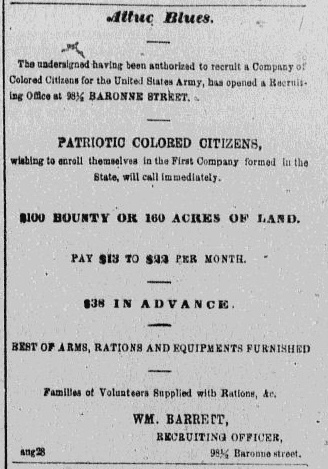
Notice in the next recruitment ad, from an 1862 New Hampshire newspaper, a $100 bounty was offered for mounted service in the U.S. Army. Unmarried men between the ages of 21 and 35 who could serve for three years would be paid from $13 to $22 per month, but no advance payment was mentioned. They would leave Concord, New Hampshire, for training and as soon as proficiency was achieved, would be transferred to active service.
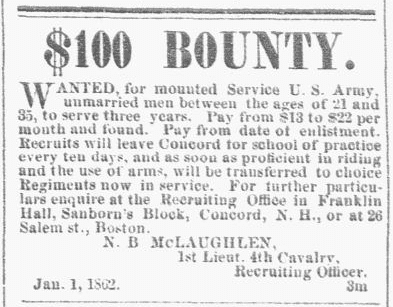
Free Military School
Inducements for commanders often differed from what was offered enlisted men. For example, in this 1864 Pennsylvania newspaper recruitment ad, applicants for commands of colored troops were offered the chance to attend a free military school.
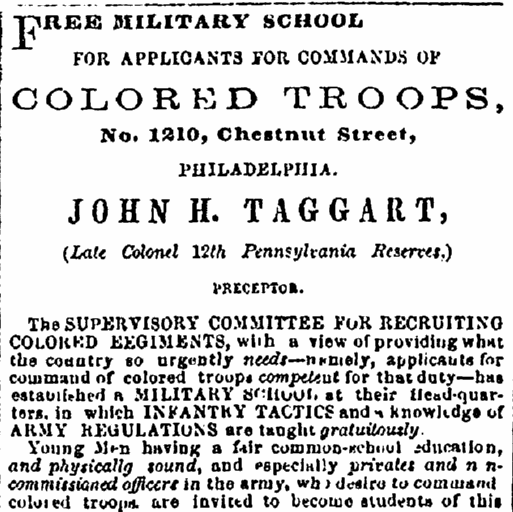
Shortened Service
A big concern for recruits was how long they would be away from their families and occupations. One enticement was to give credit for full service but allow them to complete a shorter term.
An example can be seen in this 1861 New York newspaper recruitment advertisement. The 18th Regiment N. Y. S. Volunteers needed about 200 men between the ages of 21 and 40. They received the same pay and bounty as those enlisting for three years – but their service was shortened to eighteen months, as they would be completing “the unexpired term of two years from the 17th of May last.”
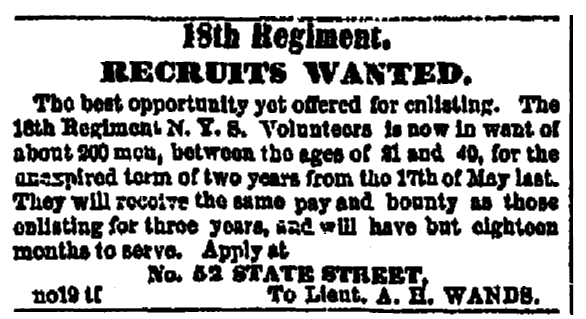
Weaponry
Another recruitment ad in the same New York newspaper offered a competing inducement: to equip a company of sharpshooters “with the very best weapons that can be procured.” The offer was further sweetened by the promise that “the inducements are largely ahead of any other branch of the service.”
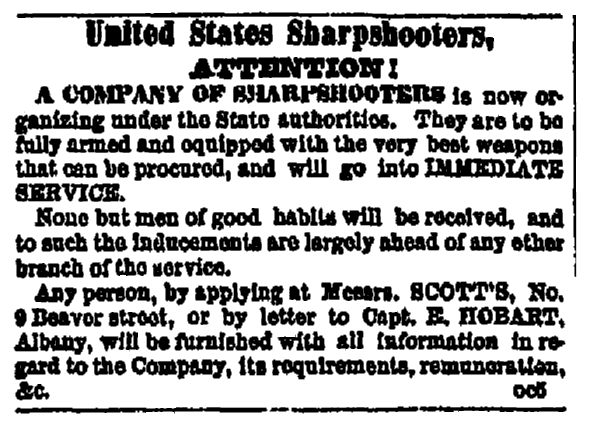
Pensions
In addition to sign-up bounties, laws were passed to grant pensions after service. Although we don’t see many of these pension offers printed in advertisements, GenealogyBank’s collection of historical and government documents, such as the U.S. Congressional Serial Set, has many pension-related articles to review.
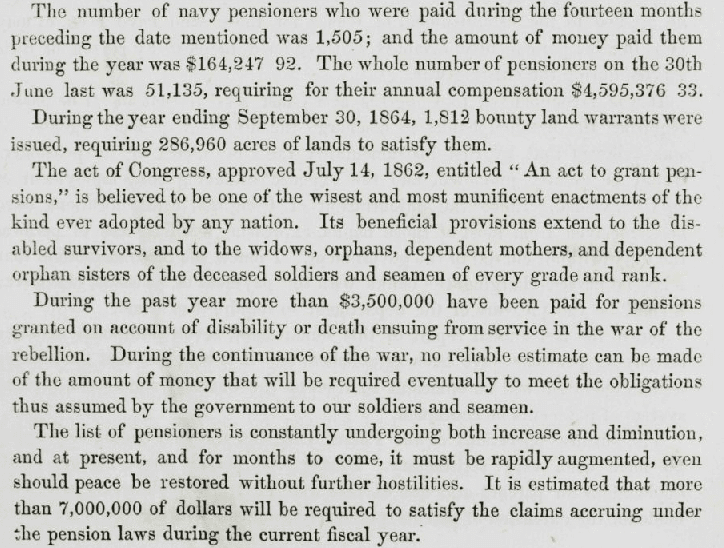
The Military Draft
And we mustn’t forget about the draft. When recruiting efforts failed to get enough men to enlist, drafts were imposed.
Notice in this 1861 Louisiana newspaper draft announcement how regiments were formed by address.
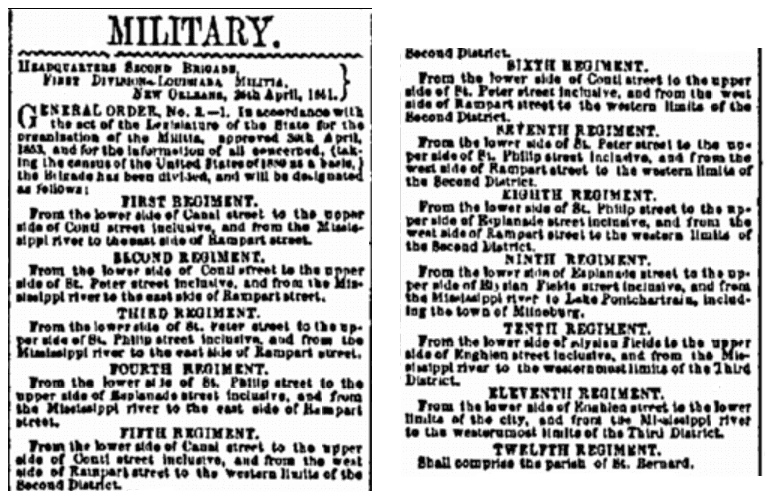
What fun. If you can identify your ancestor’s regiment, you could pinpoint where the family lived. Some draft announcements mention specific streets and parishes, such as the Twelfth Regiment which was comprised of the Parish of St. Bernard. Others were:
- First Regiment: From the lower side of Canal street to the upper side of Conti street inclusive and from the Mississippi River to the east side of Rampart street.
- Second Regiment: from the lower side of Conti street to the upper side of St. Peter street inclusive, and from the Mississippi river to the east side of Rampart street.
- Third Regiment: From the lower side of St. Peter street to the upper side of St Philip street inclusive, and from the Mississippi river to the west side of Rampart street.
The same draft announcement specified who was required to enlist under the recent act:
All free white males who have resided [in] the state sixty days, and are eighteen years of age, and not yet forty-five, and who are not attached to any volunteer company of this state, and who are not yet exempt under the laws of the Confederate States, or of this state, are liable to militia duty; and all such persons residing within the limits of the Brigade will be enrolled forthwith, and will be required to perform the same under the act above referenced to.
By order of CHAS. A. LABUZAN
Brigadier-General Commanding.
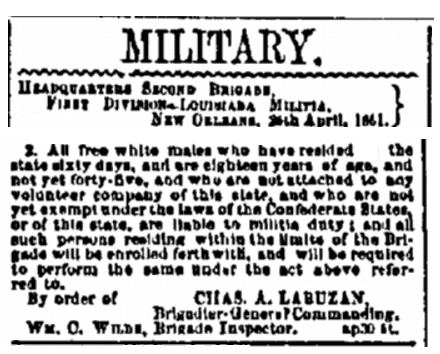
I hope this blog article induces you to take a stroll through Civil War recruitment advertisements in old newspapers. You are sure to find other surprising offers that enticed your ancestors; be sure to tell us what you find in the comments section below.
Note: An online collection of newspapers, such as GenealogyBank’s Historical Newspaper Archives, is not only a great way to learn about the lives of your ancestors – the old newspaper articles also help you understand American history and the times your ancestors lived in, and the news they talked about and read in their local papers. Did any of your ancestors serve in the Civil War? Please share your stories with us in the comments section.
Related Articles:
